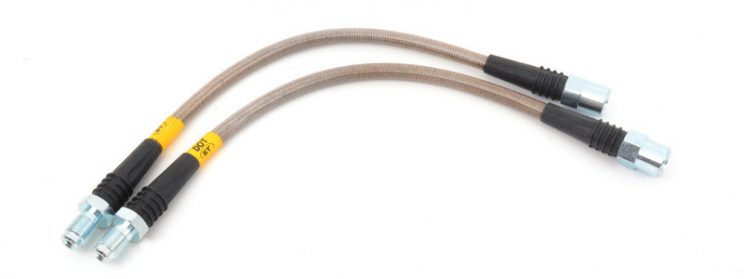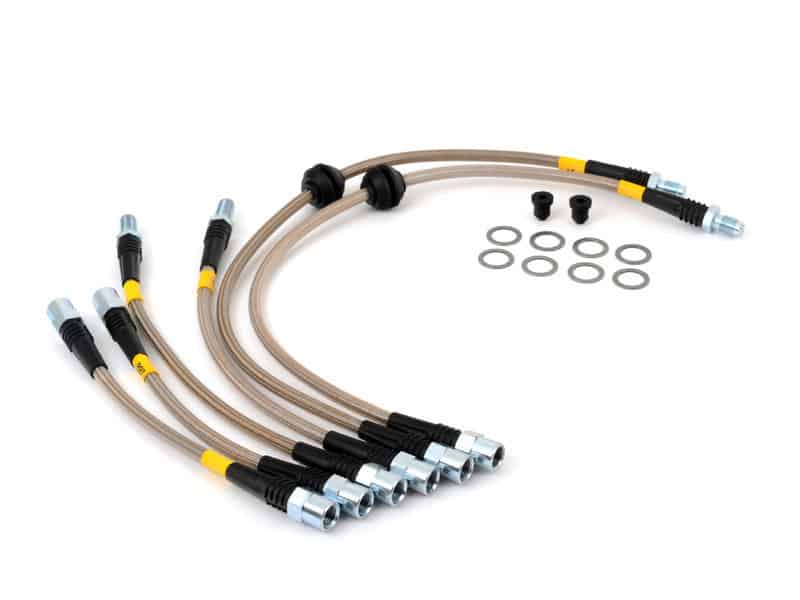
Why are rubber lines used from the factory?
Manufacturers often take low cost options when assembling a car. Rubber brake lines also offer cheap maintenance in the future when they wear out. Factory rubber lines offer all the properties needed; resistant to corrosion from brake fluid, cheap and flexible for the moving suspension the calipers are attached to.
How do factory rubber lines wear out?
Like any rubber component exposed to the elements, oxidation occurs over time and begin to break the rubber down. Additionally, each the brake pedal is pressed, a pressure is created pushing fluid through the lines. The rubber lines will expand from an outward pressure causing a soft and unresponsive pedal feel. Additionally, heavy braking causes your calipers to get extremely hot, the heat from the calipers can transfer to the brake fluid. Heat will accelerate the breakdown of the rubber hoses ultimately leading them to leak and fail.
Why do cars have a combination of hard (metal) and (soft) flexible brake lines?
Ideally, hard lines would be used all over the vehicle. Hard lines do not need any maintenance unless they become clogged with dirty brake fluid. Hard lines are used under the body of your car, where debris from the road is less likely to puncture a line. Unfortunately, the brakes are attached to the wheels which move up and down and turn from steering. Because of this, flexible lines are needed between the caliper and hard lines mounted on the vehicle body to provide freedom of movement.
What are the advantages of stainless steel brake lines?
➊ More durable than rubber brake lines, longer life.
➋ Can handle more pressure than rubber brake lines.
➌ Do not expand like factory rubber brake lines.
➍ Less likely to get punctures like rubber brake lines.
➎ Firm pedal feel under heavy braking.
➏ Stainless brake lines look much more aggressive.
Are stainless brake lines actually stainless steel?
Yes and no. Stainless brake lines actually have a Teflon inner tube which is then wrapped in a stainless steel mesh outer layer. Teflon does not significantly expand under pressure like the rubber equivalent. The stainless mesh acts like a cage protecting the inner Teflon from the elements and also prevents the inner Teflon tube from expanding. This gives a better braking response and a firmer pedal feel compared to traditional rubber brake lines.
What are the disadvantages of stainless brake lines?
Stainless lines have a more expensive upfront cost over rubber lines. However, over time stainless brake lines will pay for themselves as a rubber set will need to be replaced multiple times before a stainless set. Furthermore, not all stainless brake lines are created equal. Stainless brake lines which do not have a PVC coating over the stainless mesh are prone to getting dirt and dust particles trapped between the stainless mesh and inner rubber tube. This will act as an abrasive over time and potentially cause leaks.
Should I buy stainless steel brake lines?
If you are a spirited driver and or do track days then yes, buy a set. You will notice much firmer and consistent brake pedal feel under heavy braking. Track cars see much more abuse than streetcars and it is a no-brainer to buy more durable brake lines. Safety should always be a concern during a track event and the brake system is your primary safety system. If you do not participate in track days but plan on keeping your vehicle for a long time, buy a set. As stated above, they will outlast several sets of standard rubber lines and will save you money over the life of ownership.
Stainless clutch lines.
Similar advantages of stainless steel brake lines can also be seen when replacing the factory rubber clutch line to a stainless line.
Further reading on brakes.
Click HERE to learn the advantages and disadvantages of different brake rotor designs.



